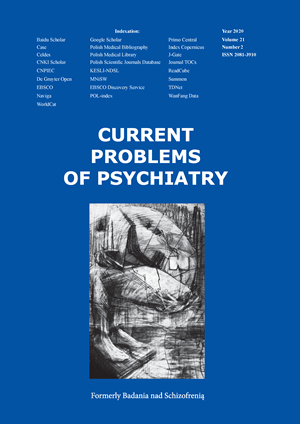Deep brain stimulation (DBS) in resistant mental disorders
DOI:
https://doi.org/10.2478/cpp-2020-0008Keywords:
deep brain stimulation, drug-resistant, neuromodulationAbstract
Introduction. Deep Brain Stimulation can directly alter brain activity in a controlled manner and the effect is reversible. The mechanism is that the electrode acts locally on neural activity, which is transferred to monosynchronous and multisynaptic network connections.
Methods. We present studies conducted on a group of patients that show an improvement in mental state after Deep Brain Stimulation.
Material. The diseases we included in our work are: Obsessive-Compulsive Disorder, Eating Disorder, Depression and Bipolar Affective Disorder.
Discussion. The use of deep brain stimulation can inhibit development of acute state of patients and improve both psychiatric features and the time of remission. The results indicate the greatest effectiveness of Deep Brain Stimulation in Obsessive-Compulsive Disorders.
Conclusions. Brain stimulation may be a promising therapeutic target in mental illness. In a properly selected location, it can contribute to a significant clinical improvement however further research in this direction is necessary.
References
1. Graat I., Figee M. & Denys D. The application of deep brain stimulation in the treatment of psychiatric disorders, International Review of Psychiatry, 2017;29:2, 178-190. https://doi.org/10.1080/09540261.2017.1282439
2. Zrinzo L, Foltynie T, Limousin P, Hariz MI: Reducing hemorrhagic complications in functional neurosurgery: a large case series and systematic literature review. J Neurosurg. 2012; 116: 84-94. https://doi.org/10.3171/2011.8.jns101407.
3. Pool JL. Psychosurgery in older people. J Am Geriatr Soc 1954;2:456-66. U.S. Department of Health and Human Services.
4. FDA approves implanted brain stimulator to control tremors. Retrieved October 18, 2006
5. Drobisz D., Damborská A. Deep brain stimulation targets for treating depression. Behav Brain Res, 2019; 359, 266-273. https://doi.org/10.1016/j.bbr.2018.11.004
6. Grat I., Figee M., Denys D. The application of deep brain stimulation in the treatment of psychiatric disorders 2017; 178-190.
7. Vicheva P, Butler M, Shotbolt P. Deep brain stimulation for obsessive-compulsive disorder: A systematic review of randomised controlled trials. Neuroscience & Biobehavioral Reviews 2020; 109; 129-138.
8. Goodman WK, Storch EA, Cohn JF, Sheth SA. Deep Brain Stimulation for Intractable Obsessive-Compulsive Disorder: Progress and Opportunities. American Journal of Psychiatry 2020; 177(3): 200-203.
9. Beszłej JA, Siwicki D, et al. Głęboka stymulacja mózgu w zaburzeniu obsesyjno- kompulsyjnym – dwa przypadki kliniczne. Psychiatria Polska 2019; 53(4): 807-824.
10. Oudijn, M.S., Storosum, J.G., Nelis, E. et al. Is deep brain stimulation a treatment option for anorexia nervosa?. BMC Psychiatry 2013; 13, 277.
11. Wagner A, Aizenstein H, Mazurkewicz L, Fudge J, Frank GK, Putnam K, et. al. Altered insula response to taste stimuli in individuals recovered from restricting-type anorexia nervosa. Neuropsychopharmacology. 2008; 33: 513-523.
12. Frank GK., Kaye WH. Current status of functional imaging in eating disorders. Int J Eat Disord 2012; 45: 723-736.
13. Wu H., Van Dyck-Lippens PJ., Santegoeds R., Van KK., Gabriels L., Lin G., et. al. Deep-brain stimulation for anorexia nervosa. World Neurosurg. 2012; 80: S29.e1-S29.
14. Lipsman N, Woodside DB, Giacobbe P, Hamani C, Carter JC, Norwood SJ, et. al. Subcallosal cingulate deep brain stimulation for treatment-refractory anorexia nervosa: a phase 1 pilot trial. Lancet. 2013; 381: 1361-1370.
15. Liu W., Zhan S., Li D., et al. Deep brain stimulation of the nucleus accumbens for treatment- refractory anorexia nervosa: A longterm follow-up study. Brain Stimulation 2020; 13: 643-649
16. Silava L., Naciff T., Oliveira M. Deep Brain Stimulation as a Treatment Approach for Anorexia Nervosa: a Systematic Literature Review. Arquivos Brasileiros de Neurocirurgia: Brazilian Neurosurgery 2019; 38(03): 175-182
17. Bilikiewicz A. Psychiatria. Podręcznik dla studentów medycyny. Warszawa, Polska: PZWL Wydawnictwo Lekarskie; 2011.
18. Holtzheimer PE., Kelley ME., Gross RE., et al. Subcallosal cingulate deep brain stimulation for treatment-resistant unipolar and bipolar depression. Archives Of General Psychiatry 2012;69(2): 150-158.
19. Bewernick BH., Kayser S., Sturm V., Schlaepfer TE. Longterm effects of nucleus accumbens deep brain stimulation in treatment-resistant depression: evidence for sustained efficacy. Neuropsychopharmacology. 2012;37(9):1975-1985.
20. Kennedy SH., Giacobbe P., Rizvi SJ., et al. Deep brain stimulation for treatment-resistant depression: follow-up after 3 to 6 years. American Journal of Psychiatry 2011;168(5):502-510.
21. Van der Wal JM., Bergfeld IO., Lok A., et al. Long-term deep brain stimulation of the ventral anterior limb of the internal capsule for treatment-resistant depression. Journal of Neurology, Neurosurgery and Psychiatry 2020; 91(2):189-195.
22. Beszłej JA, Wieczorek T, Kobyłko A, et al. Deep brain stimulation: new possibilities for the treatment of mental disorders. Głęboka stymulacja mózgu (Deep Brain Stimulation) – nowe możliwości leczenia zaburzeń psychicznych. Psychiatr Pol. 2019;53(4):789-806. https://doi.org/10.12740/PP/OnlineFirst/103090.
Downloads
Published
Issue
Section
License
Copyright (c) 2020 Authors

This work is licensed under a Creative Commons Attribution 4.0 International License.


